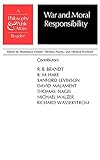War and Moral Responsibility : A Philosophy and Public Affairs Reader / ed. by Marshall Cohen.
Material type: TextPublisher: Princeton, NJ : Princeton University Press, [2022]Copyright date: ©1974Description: 1 online resource (182 p.)Content type:
TextPublisher: Princeton, NJ : Princeton University Press, [2022]Copyright date: ©1974Description: 1 online resource (182 p.)Content type: - 9780691238234
- War (International law)
- War -- Moral and ethical aspects
- PHILOSOPHY / Political
- Act of state doctrine
- Adolf Eichmann
- Adolf Hitler
- Aggression
- Ambiguity (law)
- Analogy
- Anguish
- Anti-personnel weapon
- Anti-social behaviour order
- Appeasement
- Attempt
- Belligerent
- Collective punishment
- Collective responsibility
- Combat
- Combatant
- Command responsibility
- Conscientious objector
- Conscription
- Consideration
- Crime against peace
- Crime
- Crimes of War
- Criminal code
- Criticism
- Cruelty
- Decision Analyst (company)
- Decision-making
- Declaration of war
- Demagogue
- Deontological ethics
- Determination
- Deterrence theory
- Dirty hands
- Distributive justice
- Essence of Decision
- Ethical dilemma
- Ethics
- Foreign Policy
- Foreign policy
- Hostility
- Intention (criminal law)
- International law
- Just war theory
- Law of the United States
- Law of war
- Legal burden of proof
- Massacre
- Military dictatorship
- Military justice
- Military necessity
- Military operation
- Military policy
- Moral absolutism
- Moral agency
- Moral imperative
- Moral obligation
- Moral reasoning
- Moral responsibility
- Morale
- Morality
- Nazi crime
- Nazism
- Nuremberg and Vietnam
- Obligation
- Pacifism
- Philosophy and Phenomenological Research
- Philosophy
- Politics as a Vocation
- Precedent
- Presumption
- Prisoner of war
- Probability
- Probable cause
- Public international law
- Punishment
- Relativism
- Religion
- Reprisal
- Requirement
- Respondeat superior
- Ruler
- Selective Service System
- Special case
- Subject (philosophy)
- Summary execution
- Superior orders
- The Just Assassins
- Thought
- Tort
- Tribunal
- Utilitarianism
- Vicarious liability
- War crime
- War effort
- War of aggression
- War
- Warfare
- World War II
- Wrongdoing
- 172/.4
- KZ6385 .C64
- online - DeGruyter
| Item type | Current library | Call number | URL | Status | Notes | Barcode | |
|---|---|---|---|---|---|---|---|
 eBook
eBook
|
Biblioteca "Angelicum" Pont. Univ. S.Tommaso d'Aquino Nuvola online | online - DeGruyter (Browse shelf(Opens below)) | Online access | Not for loan (Accesso limitato) | Accesso per gli utenti autorizzati / Access for authorized users | (dgr)9780691238234 |
Browsing Biblioteca "Angelicum" Pont. Univ. S.Tommaso d'Aquino shelves, Shelving location: Nuvola online Close shelf browser (Hides shelf browser)

|

|

|

|

|

|

|
||
| online - DeGruyter Water for Gotham : A History / | online - DeGruyter A Century in Books : Princeton University Press 1905-2005 / | online - DeGruyter Creating the Couple : Love, Marriage, and Hollywood Performance / | online - DeGruyter War and Moral Responsibility : A Philosophy and Public Affairs Reader / | online - DeGruyter The Making of Urban America : A History of City Planning in the United States / | online - DeGruyter Written on the Body : The Tattoo in European and American History / | online - DeGruyter What Makes Us Think? : A Neuroscientist and a Philosopher Argue about Ethics, Human Nature, and the Brain / |
Frontmatter -- CONTENTS -- Preface -- PART I War and Moral Responsibility -- War and Massacre -- Utilitarianism and the Rules of War -- Rules of War and Moral Reasoning -- Political Action: The Problem of Dirty Hands -- PART II War and Moral Responsibility -- World War II: Why Was This War Different? -- Responsibility for Crimes of War -- The Relevance of Nuremberg -- Selective Conscientious Objection and the Gillette Decision -- The Contributors
restricted access online access with authorization star
http://purl.org/coar/access_right/c_16ec
This remarkably rich collection of articles focuses on moral questions about war. The essays, originally published in Philosophy & Public Affairs, cover a wide range of topics from several points of view by writers from the fields of political science, philosophy, and law. The discussion of war and moral responsibility falls into three general categories: problems of political and military choice, problems about the relation of an individual to the actions of his government, and more abstract ethical questions as well. The first category includes questions about the ethical and legal aspects of war crimes and the laws of war; about the source of moral restrictions on military methods or goals; and about differences in suitability of conduct which may depend on differences in the nature of the opponent. The second category includes questions about the conditions for responsibility of individual soldiers and civilian officials for war crimes, and about the proper attitude of a government toward potential conscripts who reject its military policies. The third category includes disputes between absolutist, deontological, and utilitarian ethical theories, and deals with questions about the existence of insoluble moral dilemmas.
Mode of access: Internet via World Wide Web.
In English.
Description based on online resource; title from PDF title page (publisher's Web site, viewed 29. Jun 2022)


